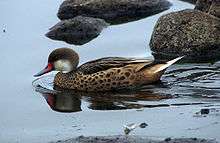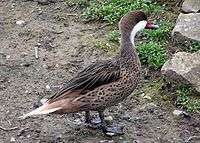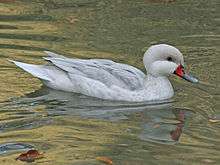White-cheeked pintail
| White-cheeked pintail | |
|---|---|
 | |
| Anas bahamensis galapagensis | |
| Scientific classification | |
| Kingdom: | Animalia |
| Phylum: | Chordata |
| Class: | Aves |
| Order: | Anseriformes |
| Family: | Anatidae |
| Genus: | Anas |
| Species: | A. bahamensis |
| Binomial name | |
| Anas bahamensis | |
| Subspecies | |
The white-cheeked pintail (Anas bahamensis), also known as the Bahama pintail or summer duck,[2] is a species of dabbling duck. It was first described by Linnaeus in his Systema naturae in 1758 under its current scientific name.[3]
Distribution and habitat
It is found in the Caribbean, South America, and the Galápagos Islands.[4] It occurs on waters with some salinity, such as brackish lakes, estuaries and mangrove swamps.[4] There are three subspecies:
Description
Like many southern ducks, the sexes are similar. It is mainly brown with white cheeks and a red-based grey bill (young birds lack the pink). It cannot be confused with any other duck in its range.[4]
Behaviour
The white-cheeked pintail feeds on aquatic plants and small creatures obtained by dabbling. The nest is on the ground under vegetation and near water.[4]
Aviculture
It is popular in wildfowl collections, and escapees are frequently seen in a semi-wild condition in Europe. A leucistic (whitish) variant is known in aviculture as the Silver Bahama pintail.[2]
Gallery


 Adult on left with red at the base of its beak and a juvenile with an all black bill on the right
Adult on left with red at the base of its beak and a juvenile with an all black bill on the right
 Whitish variant
Whitish variant- Two white-cheeked pintails on the Island of Santa Cruz in the Galápagos Islands
- Taken in the Galapagos Islands
References
- ↑ BirdLife International (2012). "Anas bahamensis". IUCN Red List of Threatened Species. Version 2013.2. International Union for Conservation of Nature. Retrieved 26 November 2013.
- 1 2 3 4 5 Cowell, Dan. "Bahama Pintail / White-cheeked Pintail". Harteman Wildfowl. Jan Harteman. Retrieved 2012-04-29.
- ↑ (in Latin) Linnaeus, C (1758). Systema naturae per regna tria naturae, secundum classes, ordines, genera, species, cum characteribus, differentiis, synonymis, locis. Tomus I. Editio decima, reformata. Holmiae. (Laurentii Salvii). p. 124.
A. grisea, rostro plumbeo: macula laterali fulva, macula alarum viridi luteaque.
- 1 2 3 4 5 Madge, Steve; Burn, Hilary (1988). Wildfowl: An Identification Guide to the Ducks, Geese and Swans of the World (Helm Identification Guides). Christopher Helm. pp. 224–225. ISBN 0-7470-2201-1.
External links
| Wikimedia Commons has media related to Anas bahamensis. |
- White-cheeked Pintail videos, photos, and sounds on the Internet Bird Collection
